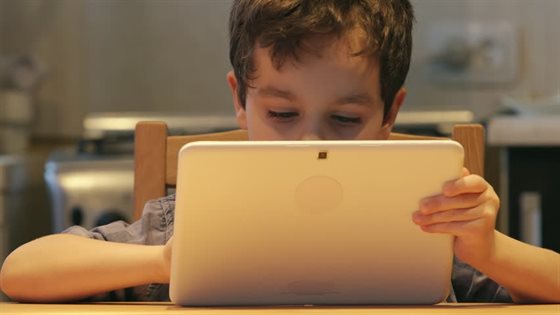A study of how primary school children use computer tablets such as iPads and Kindles at home has found a ‘growing dependency’ on the technology, researchers reported today.
Eight and nine year olds told academics how they would stare at their tablets while they were being charged up and that it was difficult to switch them off. Some slept with them under their pillows so they could wake up in the night and play them.
One girl, nine, told the research team: “I cannot live without my Kindle”.

The study, published in Computers in Human Behavior, comes as the Royal College of Paediatrics and Child Health (RCPCH) said screen time in itself is not harmful to children. It did not set a recommended limit on time spent in front of screens.
Dr Lee Hadlington, a cyber psychologist at De Montfort University Leicester (DMU) argues that screen time is not the correct benchmark to use. He said that it is what children are doing while online and the emotions they attach to technological devices at home which are key to determining the lasting effects of technology.
His qualitative study - which used primary school children from Leicestershire –identified three main themes, namely boundary battles with parents, using tablets to escape the surrounding world and emerging dependency on tablet tech.

Dr Hadlington said: “It’s the first step in understanding that in the home environment, iPads can present some key challenges not only to parents but some children as our initial findings demonstrate, some children might be exhibiting symptoms of problematic attachments to their tablets.”
Children said they used their tablets for reasons including talking to family and friends, playing games, watching films, listening to music and educational uses, such as homework and reading.
Researchers heard the children lost track of time while playing and that youngsters used the tablets to seek privacy, intentionally avoiding communicating with or playing with others.
All the children interviewed saw tablets as an important part of their lives. Most said they felt ‘happy’ or ‘excited’ using the device. When they could not use them they felt ‘annoyed’ and ‘sad’. One girl, nine, told the team: “I would feel so sad because I cannot live without my Kindle”.
RELATED NEWS:
* Interested in studying Psychology? Check out our next open day
* Which personality types suffer most when the Wi-Fi goes down? Click here
* DMU experts work with police on cyber crime
The study outlined how children would circumvent parental restrictions. One boy telling how he pretended to run a bath but sat in the bathroom playing on his tablet instead of playing. Another girl told how she would sneak downstairs when her parents were asleep to get her tablet to play.
The authors plan further research into the issues raised including interviews with parents of primary school age children. Dr Hadlington said: “The extent to which unsupervised engagement in digital technology influences the development and maintenance of key social skills or family relationships requires further investigation.
“The present study provides an exploration of daily home tablet use in children and provides a first step in highlighting the key issues which further research should aim to explore.”
Posted on Monday 4 February 2019